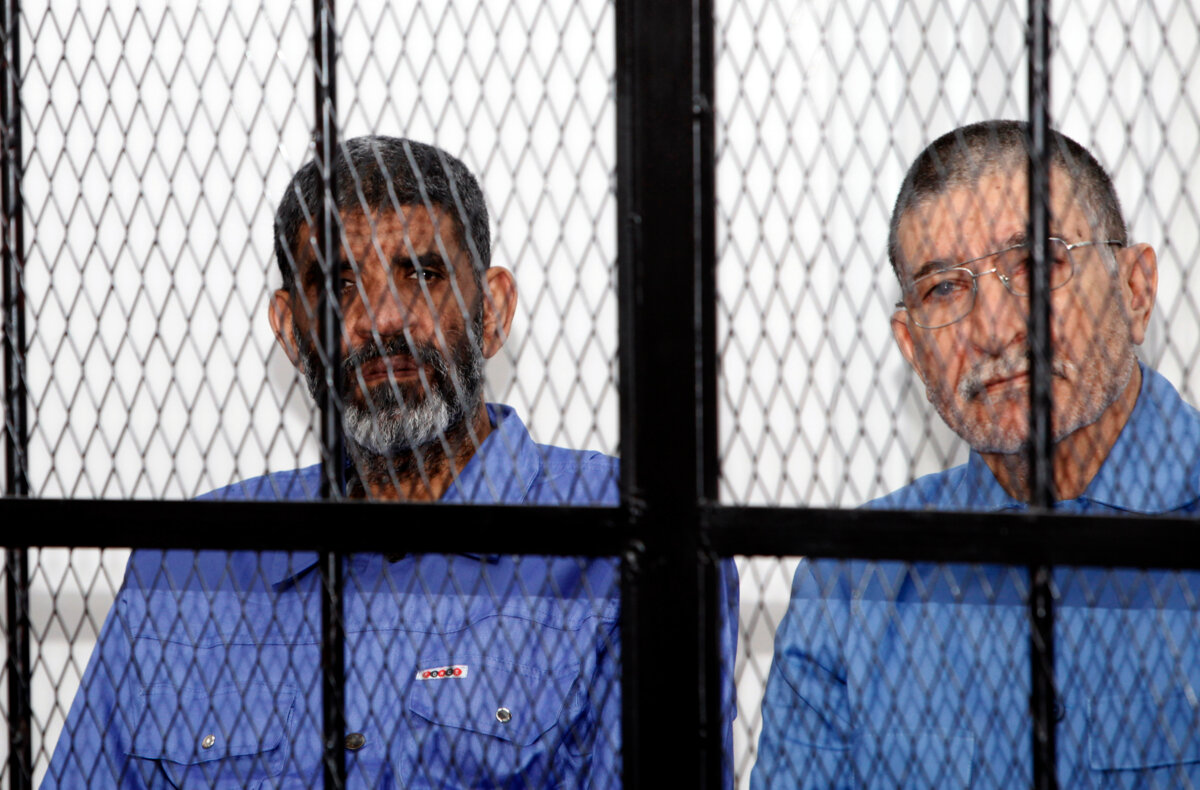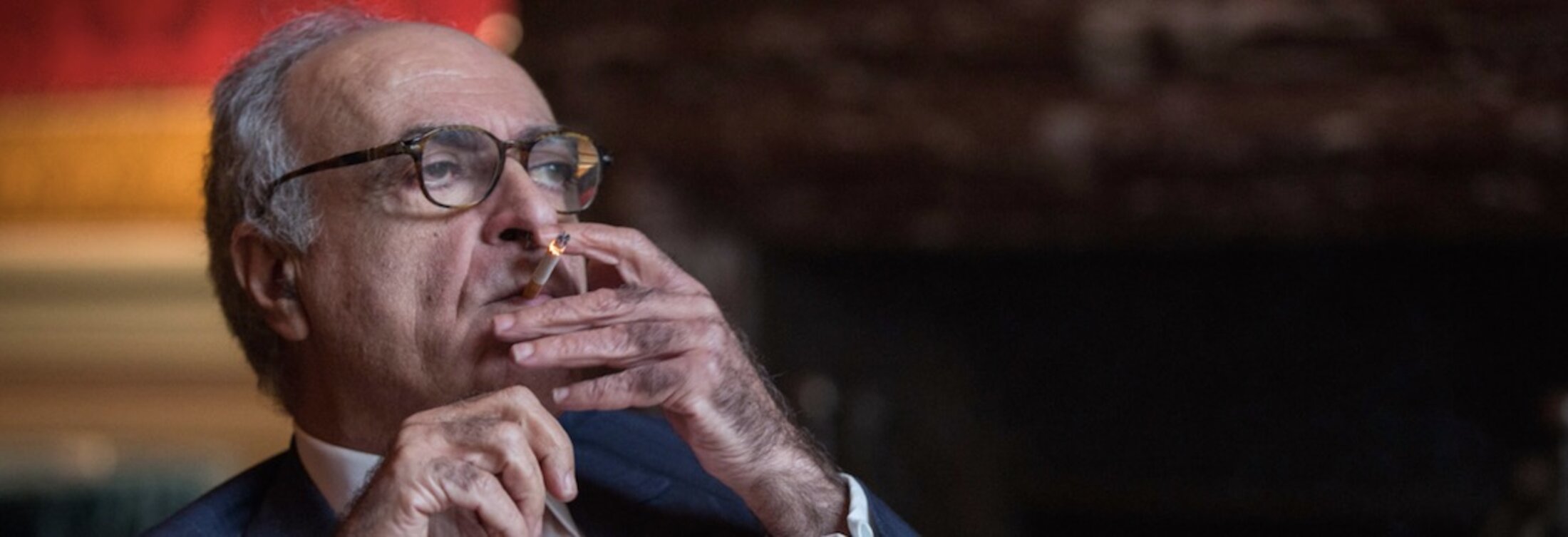There are always two sides in any corruption pact; two sets of interests and two sets of expectations. In the Libyan election funding affair, the late regime leader Muammar Gaddafi insisted that it was Nicolas Sarkozy who had come to him to “ask” for “assistance” in the latter's 2007 presidential campaign in France. But for him to agree to provide this election funding, which is now the subject of a judicial investigation in France, it presupposes that Gaddafi received assurances of something in exchange from the Sarkozy camp once the election was over.
On top of helping with Libya's potential access to nuclear energy and the international respectability afforded by Libya's leader appearing on the red carpet of the nation responsible for the Declaration of the Rights of Man, one of these return favours concerned a senior Libyan called Abdullah al-Senussi. Senussi, Libya's intelligence chief and Gaddafi's brother-in-law, had been convicted in his absence by a Paris court for his role in the 1989 UTA airliner bombing in Niger that killed 170 people, and the Libyans were keen to sort out his legal situation in relation to France.
This Libyan demand dated back to as early as 2005 and the first talks between Sarkozy's intermediary, the arms dealer Ziad Takieddine, and the Libyan authorities. We now know, thanks to revelations from Takieddine, who has confessed to carrying three suitcases of Libyan cash totalling 5 million euros in 2006 and 2007 to give to Nicolas Sarkozy and his chief-of-staff Claude Guéant, that this money was released from the Libyan regime by none other than Abdullah al-Senussi himself.
Since those revelations Takieddine has been questioned three times by detectives from the anti-corruption squad the OCLCIFF at Nanterre, west of Paris, and has confirmed and backed up in oral evidence the declarations he made on camera to Mediapart.
Abdullah al-Senussi has himself said that he oversaw the payments, mentioning the same dates, the same sums, the same people as Takieddine, when he gave evidence to the International Criminal Court in proceedings that remained secret for some time. These payments had also been referred to in a notebook in 2007 – four years before the Libyan war and the fall of Gaddafi – kept by Libya's oil minister at the time Shukri Ghanem. He later died in mysterious circumstances in April 2012; his body was found floating in the River Danube in Vienna.
As far as France was concerned Abdullah al-Senussi, the man who sent the suitcases stuffed full of cash to Paris before the 2007 presidential election, was first and foremost a fugitive from justice after a Paris court convicted him in 1999 for having organised the bombing of the UTA airliner a decade earlier. An international arrest warrant was issued against him. The efforts made by Nicolas Sarkozy and his aides to meet the Libyan demands about Senussi were thus ultimately doomed to failure.
Here Mediapart publishes four documents which nonetheless prove the different scenarios devised by the former president's entourage in a bid to extricate Sebussi from his legal predicament over the UTA airliner affair, showing scant regard for a sovereign court's verdict or the memory of the attack's many victims. This information, which have been gradually unearthed by Mediapart since April 2011, and which could be seen as forming one of the quid pro quos offered in exchange for political funding by Libya, is now being checked by investigating magistrates.
Below is an outline of the principal elements that implicate Nicolas Sarkozy and members of his close entourage in the Senussi case.
- 1) Senussi chose Sarkozy’s friend and lawyer to represent him in France

Enlargement : Illustration 1

The document reproduced further below is a letter from Abdullah al-Senussi, Libyan dictator Muammar Gaddafi’s intelligence chief and brother-in-law, addressed to Nicolas Sarkozy’s personal lawyer and friend, Thierry Herzog.
The letter, which is dated July 6th 2006, gave Herzog a mandate to represent Senussi as his lawyer regarding the Libyan’s conviction for his role in the September 1989 mid-air bombing of a French passenger aircraft over the Sahara desert. The UTA airline DC10 exploded after a timing device set off a bomb smuggled on board, killing all 170 passengers and crew, including 54 French nationals.
In March 1999, seven years before he wrote the letter to Herzog, Senussi was sentenced in absentia to life imprisonment by a Paris court after he was found guilty of masterminding the DC10 bombing operation, and an international arrest warrant was issued against him. Five other Libyan defendants, all absent from the trial, who included Libyan intelligence operatives and diplomats, were also convicted.
“I, the undersigned, Abdullah M. Senussi, born on December 20th 1952, domiciled in Tripoli, profession civil servant, hereby give Thierrey [sic] Herzog […] power of attorney to take every procedural initiative for the defence of my interests […] in the UTA case,” Senussi wrote in his letter to Herzog, which contained an error concerning the date of the Paris court ruling against him.
Questioned by Mediapart in 2011, Thierry Herzog, who is currently placed under investigation alongside Nicolas Sarkozy for suspected “corruption” and “influence peddling” in a separate case, did not deny receiving the mandate from Senussi, but dismissed its importance. “I took no legal action,” he said. “I’ve never seen this man in my life. And as for the mandate, while it was addressed to me I made no use of it.”
- 2) The plan to have Senussi’s life sentence overturned
Ziad Takieddine is the person who, acting behind the public scene, introduced Nicolas Sarkozy to Muammar Gaddafi in 2005. In the investigations into the ‘Karachi affair’, a separate, far-reaching corruption case over suspected illegal political funding from cash siphoned off from French weapons sales abroad, and for which Takkiedine appears increasingly likely to be sent for trial, the Paris magistrates in charge of the enquiry seized the Franco-Lebanese businessman’s computer hard drive as evidence. Among the documents it contained were numerous notes concerning relations between Sarkozy’s presidency and the Gaddafi regime.
On June 25th 2008, Takieddine wrote a brief report (see further below) under the unequivocal title “Note concerning Abdullah Senussi's situation”. The document detailed research into legal procedures with an aim that was made clear in the very first paragraph. “The objective is to have this decision [the 1999 conviction of the former Libyan spymaster] overturned, without him [Senussi] having to personally return to France,” it read. “A legal precedent by the Court of Appeal allows an appeal through the intermediary of a proxy.”
Takieddine cited the name, which he misspelt, of a Paris-based lawyer, Philippe Dehapiot. Questioned by Mediapart, Dehapiot admitted that he had been contacted by “a private individual”, but would not reveal that person’s identity. “The person did not follow it up,” the lawyer said. “There were legal possibilities for challenging the in absentia ruling. It could have been argued that Mr Senussi was unaware of the decision that sent him for trial. The sending for trial was notified to the public prosecutor’s office and not him in person. It could have sent the case back for investigation.”
- 3) A fax message and a meeting in Libya
The fax message (see below, in the original English), dated October 30th 2008 and sent at 2.38 p.m., was a letter from a Libyan lawyer Azza Maghur, who represented Senussi, to Thierry Herzog, Nicolas Sarkozy’s friend and personal lawyer. The letter refers to a meeting she had with Herzog on November 26th 2005 (which was one month after the first official visit to Libya by Nicolas Sarkozy, when he was French interior minister).
“As you put to us in this meeting a couple of questions to which you asked for an answer in order to obtain advantages from [a 2004 French legal reform] please find the following questions and answers as follows [sic]”, wrote Maghur. She began by outlining the question - presumably asked by Herzog – as to whether Senussi and his five co-defendants had ever been notified of the legal procedures launched against them.
In the faxed letter, Maghur said she had met with four of the six convicted Libyans who claimed to have never been directly informed of their prosecution and sentencing, and told Herzog that a Libyan “legal committee” would like to meet him in Tripoli. “All travel expenses would be covered,” she assured the lawyer, and invited him to provide “an estimate of your wages (fees and expenses)”.
- 4) A meeting with Sarkozy’s chief of staff and the recommendation to “put aside” the French arrest warrant for Senussi

Enlargement : Illustration 5

A “confidential note” written by Ziad Takieddine represents the most damning document of all. It refers to a meeting on Saturday May 16th 2009 with a certain “CG”, who is none other than Claude Guéant, the chief of staff to then-president Nicolas Sarkozy.
Guéant, who was also chief of staff to Sarkozy throughout the latter’s 2002-2007 ministerial career, is currently placed under investigation – a French legal status one step short of being charged – by magistrates leading the investigation into Libya’s suspected funding of Sarkozy’s 2007 presidential election campaign.
Takieddine’s note (see further below) concerns the conviction of Abdullah al-Senussi, and is subtitled “Conclusions of Thierry Herzog”. Which suggests that, contrary to the lawyer’s denials, Herzog did in fact become engaged in the efforts to help Senussi, who has said he was involved in providing cash payments to Sarkozy and Guéant.
“The approach, the only one that is effective, rapid and possible, and this by rapid action only, after agreement from CG”, wrote Takieddine, in his presentation of a series of legal moves apparently recommended by Herzog. They included: “To ask the Chief Public Prosecutor to provide you with the Abdullah al-Senussi case file” and “to ask the Chief Public Prosecutor to ‘put to one side’ the arrest warrant, given Senussi’s state of health and the necessity to be treated urgently in France”.
Takieddine also summarises Herzog’s “conclusions” with the recommendation that the public prosecutor should clarify whether the sending for trial of Senussi was notified to a foreign prosecution service, and if so which one, how and when.
Meanwhile, the note ends with the brief mention of two separate matters to be dealt with, one concerning Syria and a “visit CG, to be prepared”, and another concerning Iran and “the Franco-Syrian approach on the nuclear issue”.
Nicolas Sarkozy and Claude Guéant have up to now refused to comment on the elements referred to here.
-----------------------------------------------------------------------------
- The French version of this article can be found here.
English version by Graham Tearse and Michael Streeter


